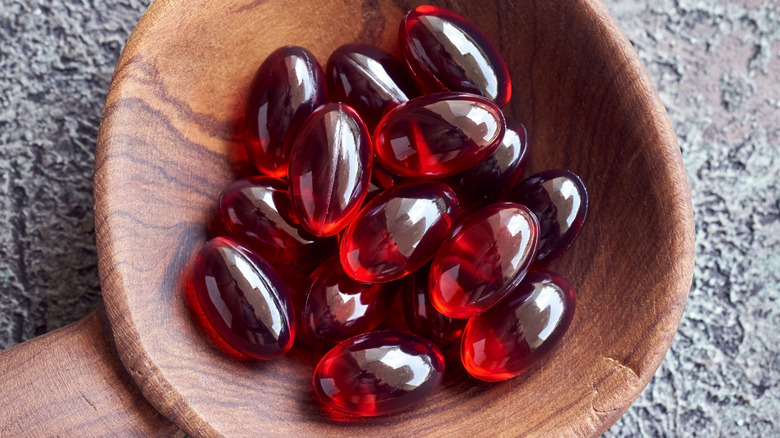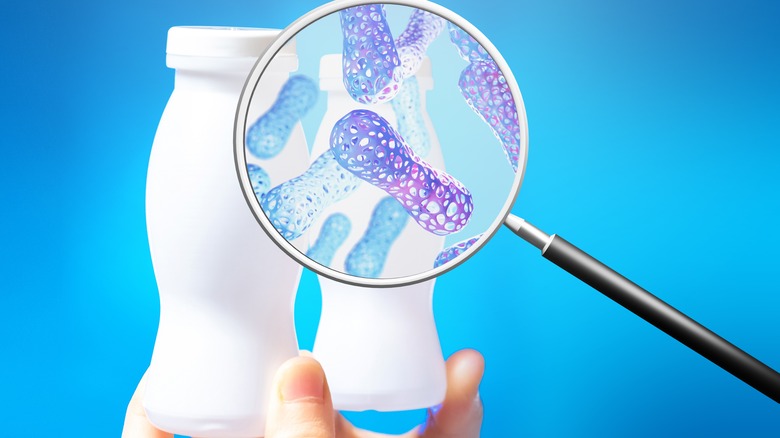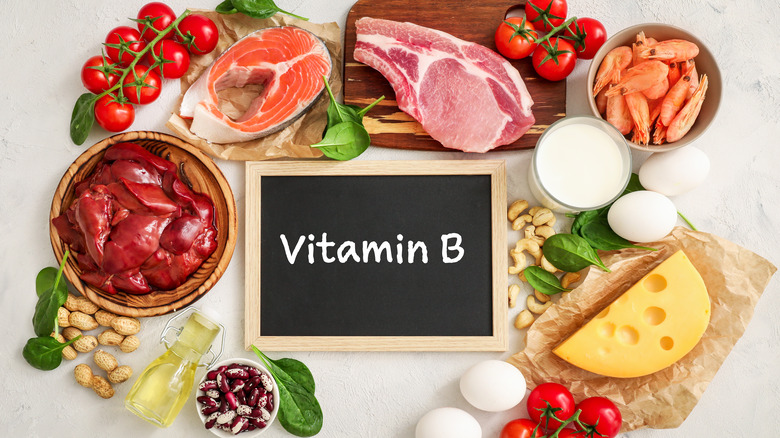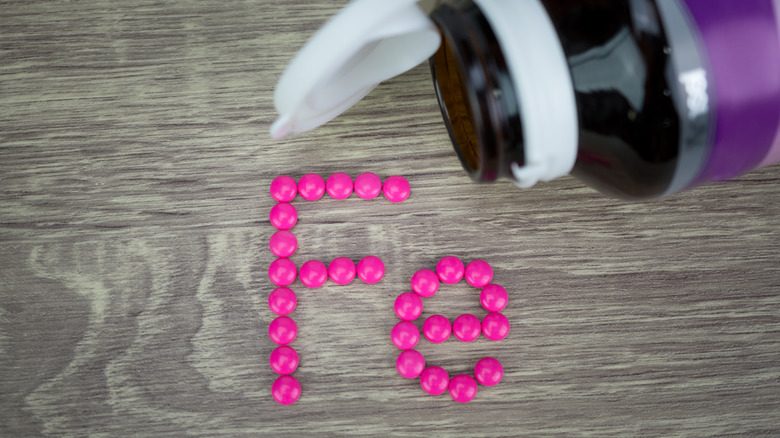10 Supplements That Can Help Treat Symptoms Of ADHD
According to the Centers for Disease Control and Prevention (CDC), Attention-Deficit / Hyperactivity Disorder (ADHD) is a common diagnosis in children. The disorder usually presents predominately as inattentiveness or hyperactivity, or a combination of the two. Kids with ADHD could find it challenging to take turns, focus on one task at a time, or get along with their peers. However, ADHD isn't only present in kids. An estimated 2.5% of adults also have the disorder (via the American Psychiatric Association).
A common treatment for ADHD is a combination of medication and behavioral therapy (per the CDC). However, vitamin and mineral supplements may also help curb some of the symptoms associated with the disorder. The Drake Institute explains that a poor diet that's deficient in much-needed vitamins and minerals can affect overall gut health, which is also associated with mental health. According to Jeanette Johnstone, an assistant professor at the OHSU School of Medicine, "ADHD is a common diagnosis, affecting upward of 7% of children, and common pharmacologic treatments can cause adverse side effects. Supplementing micronutrients may be an exciting integrative treatment for many families." If you or a loved one has ADHD and you're considering supplementation, continue reading to learn what vitamins and minerals have shown promise.
Fatty acids are key to brain function
Ultimately, ADHD is a disorder that derives from brain differences — certain parts of the brain have been found to be smaller, or to mature at different rates, in those with ADHD (via the American Academy of Child & Adolescent Psychiatry). And these differences influence everything from judgment to the perception of time. Furthermore, scientists believe that the chemicals that relay information throughout the brain via a complex network may not work the same in individuals with ADHD.
Therefore, targeting the brain is a common go-to for ADHD behavioral and medication treatments, and fatty acids — typically found in fish oil supplements (via the National Center for Complementary and Integrative Health) — could be just the supplement to help. A research paper published in a 2020 edition of Nutrients states that fatty acids are crucial to neurodevelopment, but studies have shown that people with ADHD tend to be deficient in them. One study in particular, published in Translational Psychiatry, found that supplementation with high-dose eicosapentaenoic acid (EPA), a type of fatty acid, in youth with ADHD led to an improvement of cognitive function, improving focus and helping to curb inattentiveness.
Probiotics could increase much-needed gut health
Henry Ford Health researchers have found that the microbiome in our gut could partially determine our risk for developing ADHD, based on a study following children from one month postpartum to age 10. The participants gave stool samples that researchers tested to determine the diversity of their gut bacteria. Children who had more types of bacteria in their gut when they were babies were more likely to develop ADHD by the 10-year mark than babies without the same kind of bacterial diversity. An epidemiologist at Henry Ford Health, Andrea Cassidy-Bushrow, says that, based on this information, probiotic supplementation could be a good idea in young children to assist in creating a healthy gut microbiome that could help shield against ADHD.
One randomized control trial published in Frontiers in Psychology in 2020 backs up the idea that probiotics could be helpful for people with ADHD. Participants and their parents and teachers completed evaluations at the start of the trial and again at three months. Ultimately, the child and adolescent participants self-reported a better quality of life and health after completing the probiotic supplementation trial compared to their initial assessments.
Would you rather get probiotics from your regular diet instead of taking another pill? There are plenty of probiotic-rich foods to choose from that children can enjoy, like yogurt and pickles (via Healthline). Cheeses labeled as live-cultured or active-cultured also contain probiotics.
Zinc enhances the gut-brain connection
A meta-analysis published in a 2021 edition of Scientific Reports found that people with ADHD are prone to zinc deficiency. Another scientific review published in 2009 in Acta Medica Croatica explains that zinc helps over 100 enzymes in the body that are responsible for metabolism of various bodily components, including neurotransmitters and other important brain chemicals and hormones. According to the review's authors, evidence has shown that zinc supplementation in people with ADHD can improve symptoms, perhaps because of zinc being a metabolizer and regulator of dopamine and melatonin, hormones that we need for healthy brain functioning.
A 2015 study further explains zinc's role in the gut-brain connection and how it can play a part in neurodevelopment during pregnancy and beyond. According to the researchers, zinc influences healthy gut development that the brain relies on to control pathological processes like inflammation and immunity. In other words, a healthier gut can lead to a healthier, more connected brain that can better control its processes. Furthermore, a balanced gut has "the potential to alter brain responsiveness to an emotion recognition task," according to the researchers, which could affect anxiety, depression, and other brain-connected symptoms that can coincide with neurological disorders like ADHD.
B vitamins could alleviate common ADHD symptoms
There are several B vitamins our bodies use constantly for various tasks, such as giving us energy from carbohydrates and carrying nutrients throughout the body (via the Harvard T.H. Chan School of Public Health). Folate, which is technically known as vitamin B9, is particularly important in pregnancy. According to a study published in the Journal of Child Psychology and Psychiatry, a folate deficiency in pregnancy can affect fetal brain growth and development. As a result, it also has links to increased hyperactivity and inattention in children, two primary symptoms of ADHD.
Another study published in BJPsych Open analyzed the vitamin levels of young adult patients diagnosed with ADHD. Researchers found a link between individuals with ADHD and a deficiency in vitamins B2, B6, and B9. ADDitude Mag explains that more severe ADHD symptoms, including impulsivity and hyperactivity, were connected to lower B2 and B6 levels, specifically, and that supplementing to correct a deficiency could benefit people with ADHD.
Melatonin can improve sleep patterns
Many people with ADHD struggle with sleep problems like daytime sleepiness, restless legs syndrome, sleep apnea, and the delayed ability to fall asleep. According to a review published in Attention Deficit and Hyperactivity Disorders, 62% of children with ADHD in one study had moderate to severe sleep problems. Evidence included in the analysis also showed that some medications used to treat ADHD symptoms can interfere with sleep in some individuals.
Studies have shown that melatonin may be helpful in curbing sleep disturbances in people with ADHD and autism. One systematic review published in a 2020 edition of Cureus analyzed clinical trials that examined the effects of melatonin supplementation. Overall, the researchers found that groups participating in melatonin supplementation slept longer and fell asleep faster than groups taking a placebo. Another 2019 study found that about 60% of participants saw benefits from supplementation with melatonin to improve their sleep, and none reported side effects from taking melatonin during the study.
Iron influences necessary dopamine production
Add iron to the list of minerals that people with ADHD may be deficient in. According to an analysis published in the Archives of Pediatric & Adolescent Medicine, serum ferritin tests, which show how much ferritin — an iron-containing protein — is in the blood (via Mayo Clinic), indicated low iron levels in 85% of child participants with ADHD.
Iron is incredibly important for brain health, as it's a key component of blood, allowing oxygen to make its way to cells, tissues, and organs, including the brain (via Psychology Today). According to ADDitude Mag, iron also affects the production of dopamine. Dopamine can influence attention, behavior, and mood. If levels of this neurotransmitter are imbalanced in a person with ADHD, it makes sense, then, that ADHD symptoms can become exacerbated.
Fortunately, a blood test can determine whether you may need more iron. If so, an iron supplement could do the trick. Also, many foods can help you get the daily required amount, like iron-fortified cereals, bananas, tuna, and turkey.
Ginkgo biloba might improve cognitive functioning
Ginkgo biloba is possibly one of the most well-known herbal supplements, and has been used for years by those who want to improve their memory (via Mount Sinai). Some scientific studies have shown that ginkgo biloba could protect nerve cells in the brain, which can be helpful for cognitive thinking, social behaviors, and mood.
Although many studies on ginkgo have focused on its use in dementia and Alzheimer's patients, some researchers have targeted their focus toward studying the effects of ginkgo biloba on people with ADHD. One 2015 study published in Complementary Therapies and Clinical Practice supplemented children and adolescents who had ADHD with ginkgo biloba and a psychostimulant for six weeks. Results showed improvement in attention spans, causing researchers to denote ginkgo biloba as an "effective complementary treatment for ADHD." Results from another clinical trial in 2014 suggest that daily supplementation of a ginkgo biloba extract known as EGb 761 could improve ADHD symptoms with a low risk of adverse side effects.
Vitamin D deficiency is linked to ADHD
Although one of the more common vitamin deficiencies, a lack of vitamin D can wreak havoc on the body. According to the Cleveland Clinic, not getting enough vitamin D through its main source — sunlight — or your diet can increase your risk of bone fractures, sore muscles, and fatigue. A vitamin D deficiency is also associated with mood changes.
Research has linked vitamin D deficiency with ADHD, too. A 2018 meta-analysis in Advances in Nutrition concluded that having less-than-optimal levels of vitamin D during and immediately after birth was associated with a higher risk of an eventual ADHD diagnosis. And, a controlled clinical trial published in a 2018 edition of The Annals of Pharmacotherapy found that the group of participants with ADHD had a significantly higher deficiency in vitamin D than the non-ADHD control group. Furthermore, when given vitamin D supplementation, participants with ADHD had improved cognitive functioning, including lower levels of hyperactivity, impulsivity, and inattention.
Magnesium can offer calming effects
ADHD and anxiety often go hand-in-hand (via WebMD). In fact, about 50% of adults with ADHD may also live with anxiety. Although the two conditions are separate, some treatments and therapies for ADHD may also work to reduce anxiety.
Magnesium supplementation could have positive effects on both, according to science. A 2017 systematic review published in Nutrients explains that magnesium supplementation tends to improve subjective anxiety symptoms. Also, research from the review states that acute anxiety, like getting anxious before a test or big event, can quickly decrease magnesium levels through increased urine output. However, magnesium is important in regulating the stress response system, so losing magnesium quickly from anxiety may affect your ability to stay calm.
Additionally, a review published in a 2017 edition of Current Psychiatry Reports also reports that magnesium supplementation may be beneficial for reducing ADHD symptoms in children who are deficient, though the authors advise that more studies are needed on this topic. Additionally, magnesium supplementation may have greater effects on ADHD symptoms, including mental health issues, when combined with vitamin D supplementation, according to 2021 research published in BMC Pediatrics.
Ginseng may have positive effects on inattentiveness
Ginseng is a root plant that's well-known for its historical presence in traditional Chinese medicine (via Mount Sinai). In addition to being tied to stress reduction, improved fertility, and heart health, ginseng may also influence cognitive abilities. Studies have found that memory and concentration — two common symptoms of ADHD — could be improved with the help of ginseng.
A 2011 study from the Journal of Ginseng Research studied the effects of a specific type of ginseng — Korean red — on children with ADHD using clinical assessments. Most notably, results from the Korean Personality Inventory for Children showed a significant improvement in social dysfunction indicators, but differences were also noted in anxiety and ADHD ratings. Based on the study's results, the researchers suggest that Korean red ginseng could have a positive influence on ADHD inattentiveness. A more recent 2020 study from Clinical Psychopharmacology and Neuroscience also found improvements in its participants — especially in the areas of attention, memory, and executive functioning — when they were given omega-3 and Korean red ginseng supplements.











